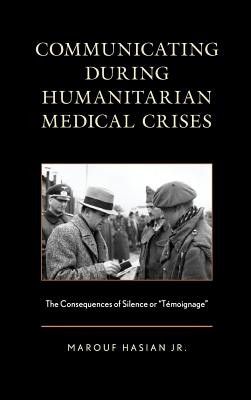
- We will send in 10–14 business days.
- Author: Marouf Hasian
- Publisher: Lexington Books
- ISBN-10: 1498593186
- ISBN-13: 9781498593182
- Format: 15.2 x 22.9 x 2.1 cm, hardcover
- Language: English
- SAVE -10% with code: EXTRA
Reviews
Description
The Promise and Perils of Silence or Temoignage During Humanitarian Crises provides readers with a nuanced study of what happens when historical and 21st century medical humanitarian communities, armed with their idealistic rhetorics, choose whether to speak out or remain silent during various military or medical crises. The author uses a series of case studies from the late nineteenth century to the early twenty-first century to illustrate the politicized nature of these decisions. Unlike some that focus on the prescriptive need to follow certain universal medical humanitarian principles during crises, this book highlights the precarious nature of what some scholars call "medical advocacy/witnessing" or what the French call "témoignage." The author argues that regardless of whether we are talking about lack of action during colonial crises or the Holocaust, it is oftentimes the lack of political will that determines how like "neutrality" or "impartiality" are interpreted. The book also acquaints readers with some of the challenges that have been recently posed to the "new" humanitarian Doctors Without Borders personnel, who have witnessed the targeting of medical hospitals and clinics. What researchers call the weaponization of medical care affects many in need living in places like Afghanistan, Iraq, Yemen, or Syria. The author concludes the book by underscoring the point that it is the presence or absence of political will, and not the inherent epistemic value of medical humanitarian principles, that dictates when this advocacy succeeds or fails.
EXTRA 10 % discount with code: EXTRA
The promotion ends in 19d.23:17:48
The discount code is valid when purchasing from 10 €. Discounts do not stack.
- Author: Marouf Hasian
- Publisher: Lexington Books
- ISBN-10: 1498593186
- ISBN-13: 9781498593182
- Format: 15.2 x 22.9 x 2.1 cm, hardcover
- Language: English English
The Promise and Perils of Silence or Temoignage During Humanitarian Crises provides readers with a nuanced study of what happens when historical and 21st century medical humanitarian communities, armed with their idealistic rhetorics, choose whether to speak out or remain silent during various military or medical crises. The author uses a series of case studies from the late nineteenth century to the early twenty-first century to illustrate the politicized nature of these decisions. Unlike some that focus on the prescriptive need to follow certain universal medical humanitarian principles during crises, this book highlights the precarious nature of what some scholars call "medical advocacy/witnessing" or what the French call "témoignage." The author argues that regardless of whether we are talking about lack of action during colonial crises or the Holocaust, it is oftentimes the lack of political will that determines how like "neutrality" or "impartiality" are interpreted. The book also acquaints readers with some of the challenges that have been recently posed to the "new" humanitarian Doctors Without Borders personnel, who have witnessed the targeting of medical hospitals and clinics. What researchers call the weaponization of medical care affects many in need living in places like Afghanistan, Iraq, Yemen, or Syria. The author concludes the book by underscoring the point that it is the presence or absence of political will, and not the inherent epistemic value of medical humanitarian principles, that dictates when this advocacy succeeds or fails.


Reviews